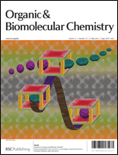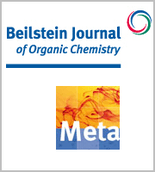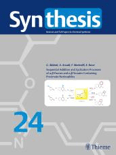
CHINESE JOURNAL OF ORGANIC CHEMISTRY
metrics 2024
Elevating Research Standards in Organic Chemistry
Introduction
The Chinese Journal of Organic Chemistry, published by Science Press, serves as a pivotal platform for advancing the field of organic chemistry since its inception in 1996. With an ISSN of 0253-2786, this esteemed journal provides robust scientific contributions, reflecting significant advancements and novel findings that are crucial to the organic chemistry community. As of 2023, it is categorized in the Q3 quartile of organic chemistry journals, positioning it within the competitive landscape of this vibrant research area, ranking #147 out of 211 in Scopus, corresponding to a 30th percentile ranking. The journal is committed to fostering a scholarly exchange of ideas and research, making it an essential resource for researchers, professionals, and students dedicated to exploring the complexities and applications of organic compounds. The Chinese Journal of Organic Chemistry continues to support the dissemination of high-quality research that contributes to both local and global scientific endeavors.
Metrics 2024
 0.33
0.33 1.80
1.80 1.30
1.30 40
40Metrics History
Rank 2024
Scopus
IF (Web Of Science)
JCI (Web Of Science)
Quartile History
Similar Journals

INDIAN JOURNAL OF HETEROCYCLIC CHEMISTRY
Fostering Collaboration in Heterocyclic ResearchINDIAN JOURNAL OF HETEROCYCLIC CHEMISTRY, published by CONNECT JOURNALS, is a vital resource in the fields of organic chemistry and biochemistry, aiming to advance research and promote innovation within the realm of heterocyclic compounds. Established in 1996, this journal has successfully converged into an influential publication with a commitment to disseminating high-quality, peer-reviewed research articles that enhance the understanding of heterocyclic chemistry applications. Although it currently holds a Q4 quartile ranking in both biochemistry and organic chemistry according to the 2023 categorizations, its broader contributions to the scientific community should not be underestimated, as it seeks to support the ongoing dialogue among researchers, professionals, and students. The journal operates from Ghaziabad, India, providing open access to its publications, thereby fostering a collaborative and informative environment for its international readership. With an ISSN of 0971-1627 and a special focus on contemporary challenges and developments in the field, the INDIAN JOURNAL OF HETEROCYCLIC CHEMISTRY is poised to make a significant impact as it continues to evolve through 2024 and beyond.

Chemistry of Heterocyclic Compounds
Advancing Knowledge in Organic Chemistry's NicheChemistry of Heterocyclic Compounds, a prominent journal in the field of organic chemistry published by Springer, has been a critical resource for researchers and professionals since its inception in 1965. With its ISSN 0009-3122 and E-ISSN 1573-8353, the journal aims to disseminate cutting-edge research on heterocyclic compounds, essential for advancements in pharmaceuticals, agrochemicals, and materials science. Although categorized in the Q4 quartile of Organic Chemistry as of 2023, this journal serves as an invaluable platform for emerging research, positioning itself within the 146th rank in the Scopus database out of 211 journals, highlighting its niche yet impactful contributions. The journal emphasizes rigorous peer-review and strives to cultivate a comprehensive understanding of heterocyclic chemistry through insightful articles and reviews. While not an open-access publication, it continues to engage a global audience interested in the complexities and applications of this pivotal area of organic chemistry. Scholars and students alike will find relevance in its discourse, as it fosters an environment of knowledge exchange crucial for the continual evolution of chemical sciences.

ORGANIC & BIOMOLECULAR CHEMISTRY
Connecting researchers through high-quality, open-access studies.ORGANIC & BIOMOLECULAR CHEMISTRY is a prestigious academic journal published by the Royal Society of Chemistry, dedicated to advancing the fields of organic and biomolecular chemistry. With its ISSN of 1477-0520 and E-ISSN of 1477-0539, this journal plays a pivotal role in disseminating high-quality research and contributing to the scientific community, particularly in biochemistry, organic chemistry, and physical and theoretical chemistry. Currently ranked in the third quartile for Biochemistry and the second quartile for Organic Chemistry and Physical and Theoretical Chemistry, it caters to a diverse audience of researchers, professionals, and students who seek insightful studies and reviews. With a publication history spanning since 2003 and ongoing till 2024, the journal fosters open access to its articles, encouraging the free exchange of knowledge. Situated in the vibrant academic environment of Cambridge, UK, ORGANIC & BIOMOLECULAR CHEMISTRY serves as a vital resource for innovative research at the intersection of chemical sciences.

ChemistrySelect
Advancing the Frontiers of Chemical ResearchWelcome to ChemistrySelect, a pivotal journal in the field of chemistry published by WILEY-V C H VERLAG GMBH. With its ISSN 2365-6549, this journal aims to provide a comprehensive platform for researchers and practitioners to share significant advancements in various areas of chemistry, contributing to the ongoing dialogue and development within the scientific community. Since its inception in 2016, ChemistrySelect has focused on publishing high-quality research that spans multiple facets of the discipline, earning its place in the Q3 category for Chemistry (miscellaneous) as of 2023. While operating under a subscription model, the journal remains committed to broadening accessibility and engaging a wide audience of researchers, professionals, and students. The journal's objective is to facilitate the dissemination of groundbreaking findings through rigorous peer review, ensuring that the latest studies reflect the evolving nature of chemistry research. As we approach 2024, ChemistrySelect continues to be an invaluable resource for the academic community, positioning itself as a trusted voice in the world of chemical research.

RUSSIAN JOURNAL OF ORGANIC CHEMISTRY
Illuminating the Path of Organic Chemistry ResearchRUSSIAN JOURNAL OF ORGANIC CHEMISTRY, published by MAIK NAUKA/INTERPERIODICA/SPRINGER, stands as a pivotal resource in the realm of organic chemistry, catering to an audience of researchers, professionals, and students keen on the latest advancements in this dynamic field. With an ISSN of 1070-4280 and E-ISSN of 1608-3393, this journal has been a fixture in academic literature since its inception in 1996 and continues to play a significant role as it converges towards 2024. Despite currently holding a Q4 ranking in organic chemistry and a modest placement in the Scopus ranks, the journal offers valuable insights and contributions that reflect the ongoing research and trends within the discipline. Though it does not operate under an open access model, the journal provides essential studies and reviews that enhance scientific dialogue and innovation. Located in the United States, the journal supports the advancement of organic chemistry, fostering a deeper understanding of complex chemical interactions and methodologies.

CCS Chemistry
Pioneering Discoveries in the World of ChemistryCCS Chemistry, published by the esteemed Chinese Chemical Society, is a leading open-access journal dedicated to advancing the field of chemistry. Since its inception in 2019, the journal has rapidly gained recognition, achieving a remarkable impact factor that places it in the prestigious Q1 category in Chemistry (Miscellaneous) as of 2023. With a Scopus ranking of #41 out of 408 in General Chemistry, CCS Chemistry represents the top 10th percentile in its category, reflecting its commitment to high-quality research and innovation. The journal serves as a vital platform for researchers and professionals to share their findings, showcase cutting-edge methodologies, and engage with the latest developments in various chemistry subfields. Accessible to a global audience, CCS Chemistry ensures that groundbreaking research is available without barriers, making it an indispensable resource for students and academics aiming to stay at the forefront of chemical sciences. For further details, submissions, and access to published articles, please visit the journal's website.

Heterocyclic Letters
Exploring the Frontiers of Heterocyclic ChemistryHeterocyclic Letters is an esteemed journal in the field of synthetic organic chemistry, published by RAMAN PUBL. With ISSN 2231-3087 and E-ISSN 2230-9632, this journal aims to disseminate original research and innovative findings related to heterocyclic compounds, which play a crucial role in medicinal chemistry, material science, and agricultural chemistry. Heterocyclic Letters provides a platform for researchers, professionals, and students to share their insights and advancements, thus fostering academic collaboration and knowledge transfer. The journal is dedicated to maintaining high-quality standards in research publication, making it an essential resource for anyone focused on the latest developments in heterocyclic chemistry. Although it does not currently offer Open Access options, the journal’s rigorous peer-review process ensures that only the most credible and impactful studies are published, contributing significantly to the advancement of the field.

RUSSIAN CHEMICAL REVIEWS
Elevating Chemical Understanding GloballyRUSSIAN CHEMICAL REVIEWS, published by the esteemed ND Zelinsky Institute of Organic Chemistry, RAS, stands as a prominent platform for disseminating high-quality research in the diverse field of chemistry. With an ISSN of 0036-021X and an E-ISSN of 1468-4837, this journal has earned its place in the Q1 quartile of Chemistry (miscellaneous) for 2023, reflecting its outstanding impact and rigorous peer-review process. The journal encompasses a wide array of topics within chemistry, providing critical reviews that advance understanding and foster collaboration among researchers, professionals, and students globally. With its consistent publication since 1970, RUSSIAN CHEMICAL REVIEWS not only serves as a valuable resource for the latest advancements in the field but also plays a crucial role in shaping future research directions. The journal is based in the Russian Federation, with its office located at 47 Leninsky Pr, Moscow 119991, RUSSIA. As an essential reference for those in the chemical sciences, it provides an ideal avenue for authors looking to publish impactful reviews that contribute to the broader scientific community.

Beilstein Journal of Organic Chemistry
Elevating organic chemistry through collaboration and open access.The Beilstein Journal of Organic Chemistry, published by the renowned BEILSTEIN-INSTITUT, stands as a pivotal platform for advancing the field of organic chemistry since its inception in 2005. With its commitment to Open Access publishing, this journal enables global readership and collaboration, fostering the dissemination of high-quality research. Operating from Germany, the journal has carved out a significant reputation, currently holding a Q2 ranking in the Organic Chemistry category, with impressive Scopus rankings placing it at #91 out of 211 in the field, achieving a 57th percentile. The Beilstein Journal is dedicated to publishing cutting-edge findings that span the breadth of organic chemistry, including synthetic methodologies, catalysis, and material sciences, making it an essential resource for researchers, professionals, and students looking to stay at the forefront of organic chemistry advancements. With a vision to enhance collaboration and knowledge sharing within the scientific community, the journal plays a vital role in shaping the future of organic chemistry research.

SYNTHESIS-STUTTGART
Advancing the Frontiers of Organic Chemistry and Catalysis.SYNTHESIS-STUTTGART
Published by the esteemed Georg Thieme Verlag KG, SYNTHESIS-STUTTGART stands as a vital resource in the field of Chemistry, specifically focusing on Organic Chemistry and Catalysis. With an impressive publication history dating back to 1970 and continuing through 2024, it serves as a platform for innovative research and developments in synthetic methodologies and their applications. The journal holds a significant impact factor, reflecting its influence within the academic community, and is recognized in the Scopus rankings as a reputable source in its categories, with a rank of #99/211 in Organic Chemistry and #43/68 in Catalysis. Researchers, professionals, and students alike can benefit greatly from its content, which upholds rigorous peer-review standards and contributes to the global discourse in these critical scientific domains.